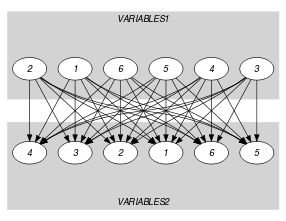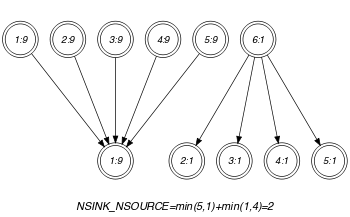5.362. soft_same_interval_var
| DESCRIPTION | LINKS | GRAPH |
- Origin
- Constraint
- Synonym
.
- Arguments
- Restrictions
- Purpose
Let (respectively ) denote the number of variables of the collection (respectively ) that take a value in the interval . is the minimum number of values to change in the and collections so that for all integer we have .
- Example
-
In the example, the fourth argument defines the following family of intervals , where is an integer. Consequently the values of the collections and are respectively located within intervals , , , , , and intervals , , , , , . Since there is a correspondence between two pairs of intervals we must unset at least items (6 is the number of items of the and collections). Consequently, the constraint holds since its first argument is set to .
- Typical
- Symmetries
Arguments are permutable w.r.t. permutation .
Items of are permutable.
Items of are permutable.
An occurrence of a value of that belongs to the -th interval, of size , can be replaced by any other value of the same interval.
An occurrence of a value of that belongs to the -th interval, of size , can be replaced by any other value of the same interval.
- Usage
- Algorithm
- See also
-
implies: .
- Keywords
constraint arguments: constraint between two collections of variables.
constraint type: soft constraint, relaxation, variable-based violation measure.
- Arc input(s)
- Arc generator
-
- Arc arity
- Arc constraint(s)
- Graph property(ies)
-
- Graph model
Parts (A) and (B) of Figure 5.362.1 respectively show the initial and final graph associated with the Example slot. Since we use the graph property, the source and sink vertices of the final graph are stressed with a double circle. The constraint holds since the cost 4 corresponds to the difference between the number of variables of and the sum over the different connected components of the minimum number of sources and sinks.
Figure 5.362.1. Initial and final graph of the constraint

(a) 
(b)